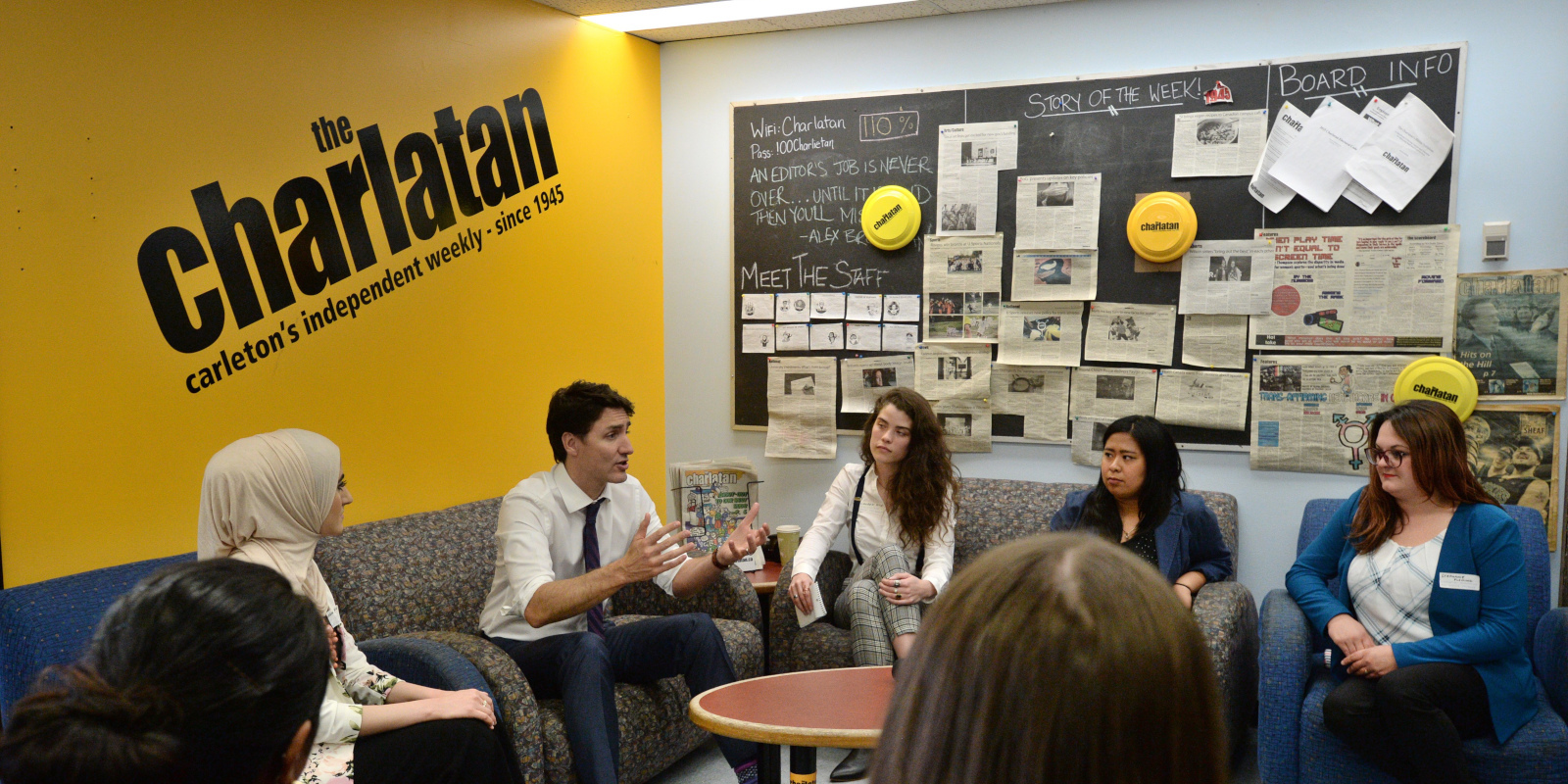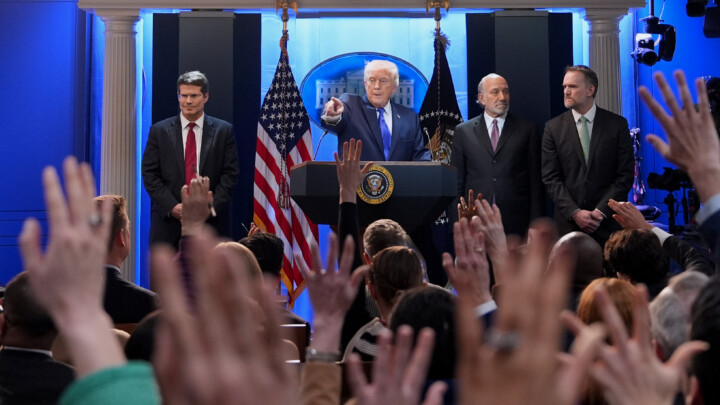The news media in Canada is in crisis. Policy responses to date are failing to solve for the information that citizens need to make informed decisions about important issues and debates. The Future of News series brings together leading practitioners, scholars, and thinkers to imagine new business models, policy responses, and journalistic content that can support a dynamic future for news in Canada.
The other day I was rummaging around in my basement and stumbled across a tattered binder from my 2010 Carleton University journalism school days. As I brushed away the dust from my 14-year-old handwritten notes, my eyes were drawn to my very first reporting class lesson. My professor, Norma Greenaway, a Postmedia journalist of 40 years, set out what we journalist hatchlings had to keep top of mind as we put pen to paper for the very first time. We had responsibilities to the reader that we had to remember. I had scribbled down some words in my notepad and underlined them twice: “Be fair and balanced.”
I was reminded of those marching orders last week when, appearing on our Hub Dialogues podcast, TVO’s The Agenda host Steve Paikin said the freshest crop of Canadian journalists had a much weaker devotion to objectivity than their predecessors. Hub editor-at-large Sean Speer asked Paikin whether he had “observed any fault lines or tensions [around objectivity] with the new generation of journalists.”
“Yes,” said Paikin. “This was a major fault line nowadays with the new journalism,” he confessed. This was big. One of the most well-known and respected impartial journalists in Canada was pointing out something my colleagues and I at CBC, CTV, and a variety of other outlets had whispered about over late-night beers for years.

Paikin continued:
“That’s the tradition that I was brought up in. I don’t seek a particular political outcome when I cover an election campaign. I believe there are many younger people nowadays who, because they have been taught this way in journalism schools, believe not only is it their job to figure out which is the best party that ought to govern, but then [to] tailor their coverage accordingly to ensure that the party that they don’t like runs into the roughest time…I think it’s a big problem.”
He went on to add that, as an “old school” journalist, he saw his job as reporting the “objective” facts on the ground. The reader needed to be allowed “to come to his own conclusion.”
Cue online Canadian journalist outrage. “I listened to it twice, I thought I was perhaps having an aneurism,” tweeted Policy Options editor-in-chief Les Perreaux. “Genuinely, at a loss here,” added The Narwhal’s Emma McIntosh. Bubbles burst in newsrooms across the nation. The consensus seemed to be that we should dismiss this sort of critique in its entirety. Nothing to see here. Everything is fine. Move along.
But there is something there.
For the record, I think Steve likely overstepped. I say this as someone who worked with him for a decade in the mainstream media. Let’s not feed outrage and potential conspiracy. I do not believe that journalism schools are nefariously and intentionally building an army of “big L” Liberal partisan flying monkeys so that they can be released into the sky and dive-bomb Conservative candidates across the country. They are not raising left-wing partisans, or telling them to support left-wing political parties.
However, journalism schools are now developing and encouraging almost exclusively left-wing storytellers, who are most comfortable with progressive storylines, and who often question the value of objectivity. And, at the end of the day, isn’t that almost as bad for Canadian democracy?
In the newsroom: what makes a story?
I have had the privilege of mentoring countless journalism school students and interns for the last ten years, so I have had a front-row seat for this shift in journalistic thinking. I have watched, in real-time, how a new generation of journalists has changed the reasoning around what the purpose of journalism is, whether objectivity matters, and what constitutes a good story.
Five or so years ago I started noticing that nearly every pitch that came out of their mouths fell within the “social justice” realm. More specifically, pitches were from the new progressive and increasingly orthodox and illiberal perspective. They dealt with various conditions of victimhood, that were not to be questioned but emblazoned on the banner of universal justice.
This is not to say that some of these stories didn’t deserve to be told. They should make up a slice of the journalistic story pie. But…the whole pie?
Stories increasingly fit a mold of “_______ group felt hurt by _______. Here is their story.” Their coverage increasingly prioritized “lived experiences” over expertise, and “first-person accounts” instead of data. The job was sometimes seen as a way to upend power structures. Truths multiplied. Stories about members of a community could only be told by members of that community. Interns and students were at a loss when it came to finding right-leaning sources. It was rare, if ever, that they suggested a debate-style program. Many weren’t checking their biases at the door. It seemed that some believed it was their job to tell their audience what was wrong, who was in the wrong, and what needed to be done about it, rather than allowing the audience to draw their own conclusions.
What I could not determine was how much of this was caused by a new generation that saw the world differently, or a new kind of journalism professor in front of the chalkboard. Or whether it was both.
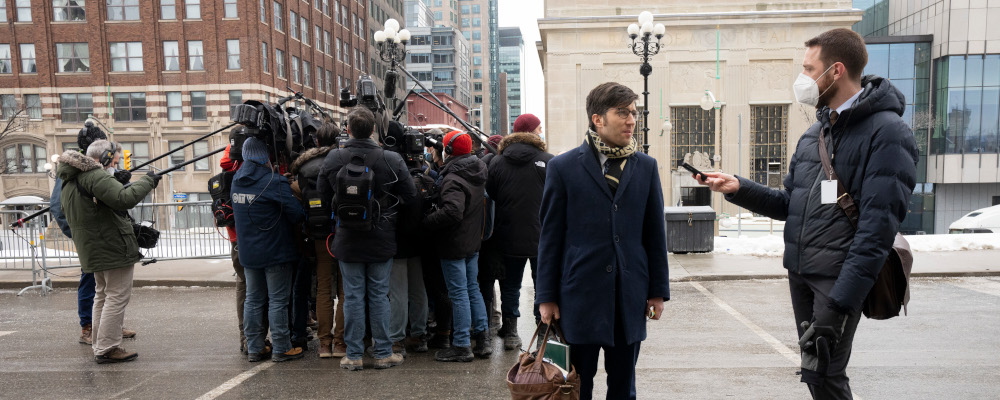
In the classroom: what makes a lesson?
Following the 2020 murder of George Floyd in the United States, the wave of reckoning over racism crossed the border and lapped up against the doors of Canada’s top journalism schools.
In Toronto, a Ryerson University (now Toronto Metropolitan University) journalism student-led committee wrote an open letter claiming “institutionalized racism and discrimination” at the journalism school had “caused trauma for past and present students alike.” More than 200 signatories, many of whom identified as Black, Indigenous, people of colour (BIPOC), and LGBTQ2IA+ said their school “contributed to an unsafe learning environment” that “resulted in perpetuated systemic racism, further traumatizing students and reinforcing the values of discrimination that Ryerson University was built on.” They insisted the idea of objectivity in journalism undermined marginalized experiences.
Student testimony included in-depth descriptions of alleged microaggressions, anxiety attacks, and tearful moments. The students and graduates called for staff to attend mandatory “Equity, Diversity, and Inclusion (EDI)” training and “de-escalation, mental health, and empathy” lessons. The journalism curriculum, they insisted, needed to become “equitable, accessible, and decolonized.” If their demands were not met, they said the Canadian media industry would continue to be a product of “perpetuated whiteness and elitism.” If their directions were followed, they insisted, together they and the school would build the next generation of Canadian journalists.
Before the letter had even been released to the press, TMU’s School of Journalism chair Janice Neil and associate chair Lisa Taylor both resigned, saying it was time for a “major reset.” The faculty that remained promised to “transform” their journalism curriculum by enacting as many of the requests as possible, as quickly as possible. They would prioritize the student experience “through a lens of EDI,” expand the “understanding of what journalism is,” and introduce “critical approaches” to reporting classes. They also swore to provide equity training for staff, create “safe space forums” and look into erasing the name “Ryerson” from student paper mastheads.
In Ottawa, racialized students also used this moment to advocate for “institutional change” within a Carleton journalism department they described as a hotbed of white supremacy. An open letter written by 21 journalism students and graduates was published accusing the school of “perpetuating systemic discrimination” against Black, Indigenous, and other people of colour and “deterring them from pursuing careers as journalists.” The letter described “racist slurs” and “microaggressions.” It listed, in detail, harmful situations students said they had experienced, including being mistaken for international students, repeated criticism of accents, and a lack of Black teachers. This group also challenged the idea of journalistic objectivity, which they claimed was an idea invented by “white, straight, cis-male journalists.” Among their list of requirements, the signatories called for all staff to undergo repeated anti-bias and critical race theory training. They also demanded the journalism school start surveying the race of journalism students.
“The reality is journalists are coming into the workspace not fully understanding the fundamentals of journalism. Activism has crept into their journalism.”
Senior CBC host
How did the adult faculty, composed of veteran journalists, respond to this call for major reform? They endorsed it. The staff acknowledged their role “in the perpetuation of systemic racism in the education of young journalists.” They assigned unconscious bias training for all instructors and armed them with a diversity and inclusion curriculum checklist that instructed them to teach non-traditional views on objectivity. They encouraged staff to enroll in an educational retreat entitled “Theatre of the Oppressed.” They redesigned the first-year courses to ensure they had “a strong central focus on diversity and inclusion.” They said journalists and journalism students must “challenge and dismantle a white supremacist colonial mindset which we have internalized both collectively and individually” at the journalism school and in the industry. They injected “antiracist and decolonial pedagogies” into the curriculum. Overall, the journalism school promised it would practice “anti-racism” and “anti-oppression.” Finally, the faculty expressed how much they valued “lived experience.” For a school that once taught me to use simple everyday language, they were certainly not practicing what they preached in their press releases.
A handful of the changes made sense. Of course the faculty should attract more diverse instructors. Of course minority voices have sometimes been ignored or misrepresented in Canadian reporting. Of course journalism students should be obligated to take a course on reporting on Indigenous Peoples. Of course there should be financial support for racialized students who are struggling financially.
But you can call out racism and promote diversity without doing it entirely through the lens of the new identity politics.
Politics is the keyword here. Approaches like those referenced above are inherently political. They are regularly and exclusively employed by left-wing thinkers and left-wing political parties. I am sure many of the people using them mean well and believe they are committing real positive change. But, by accepting these demands in the way these schools did—fully embracing, promoting, and teaching this terminology and the issues that come with it—journalism schools send a political message to their students that this is the “correct” and perhaps only way to see the world and tell the stories of Canadians.
As journalist and podcaster Tara Henley summarized on our Hubs Dialogue podcast last week, “This thinking has dominated the media…It is presented as a moral imperative. ‘If you are a decent person this is how you should think about the world.’ It is not presented as an ideology…[But] this is a political ideology and we are politicizing content.”
In sum, these schools act like they have cornered the moral market. They end up producing young journalists who struggle to understand or appreciate any competition to the progressive worldview.
This “new journalism” education means students are often not ready to practice their trade in the real world. Yesterday, I spoke with a senior CBC host, who asked to remain anonymous. “The reality is [student] journalists are coming into the workspace not fully understanding the fundamentals of journalism,” they said. “Activism has crept into their journalism. Thankfully vetting and editing by more seasoned staff catch a bunch of it. But it’s there.”
A CTV journalist, also wishing to remain anonymous, recently described it to me this way, “Younger journalists entering newsrooms are often more committed to sticking to their own idealism, than considering a story from every angle,” she said. “They have practised technical skills, but lack news judgement, perspective and are unprepared to be challenged, or to challenge their own assumptions. The result is stories and news copy that lacks critical context or meaningful insight.”
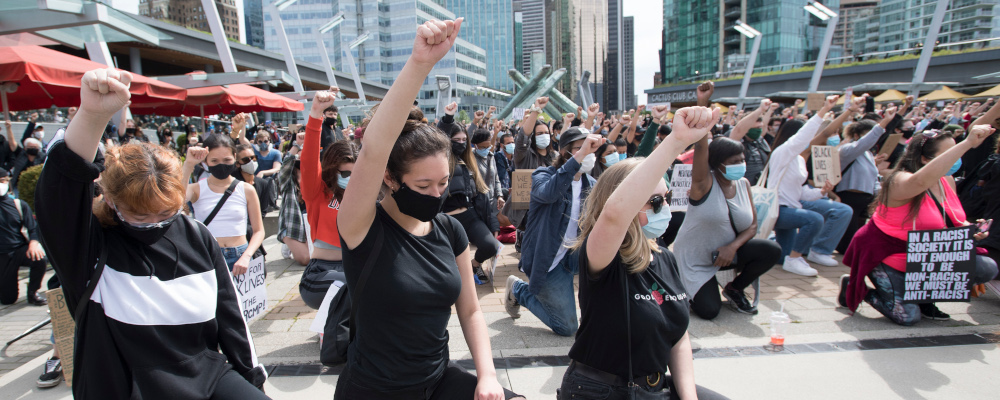
For me, it is all the more egregious given that J-school is about educating the next generation of storytellers. Journalism teachers have immense power and responsibility when it comes to influencing the thinking of their students. On the first day of fall semester, professors are met with near-blank slates—young, impressionable students who have few major points of reference when it comes to the craft of reporting. They are the ones teaching those who will inform Canadians about their country. It should be the professor’s job to encourage students to seek out the full range of perspectives, exposing students to the issues and stories that Canadians on both the Left and Right value. Instead, the message sent to journalism students who consider “right-wing” topics or perspectives is that their kind of thinking is not welcome, and even more troubling, not morally right.
The future isn’t the brightest for our journalism schools, making a return to reason all the more necessary. Six Canadian journalism school programs recently paused or shut down admissions. Trust in Canadian news has dropped 18 percent in five years. Canadians’ interest in the news has dropped by more than 20 percent in just six years. Jobs are disappearing, with some estimates showing there are less than 10,000 of us journalists left.
While I am sure there are still rational journalism professors out there teaching the craft skillfully and without bias, I am increasingly worried.
Last week, I raised some of my worries with the current director of Carleton’s journalism program Allan Thompson; a man I respect, one who taught me journalism. He’s also someone who has no doubt worked to check his own biases, having twice run for the federal Liberals. Thompson listened politely, didn’t engage with my broader concerns, and graciously invited me to “debate the nature of objectivity until the cows come home.”
What’s to be done?
So, what is to be done? In my own small way I have tried my best to counter some of this as a journalism mentor, offering some selective “unlearning” lessons. I have tried to teach students and interns that truth is not an “orthodoxy already known to an enlightened few whose job is to inform everyone else”, but a “process of collective discovery”. I have told them that, while perfectly pure objectivity does not exist, as journalists we must identify our biases, check them at the door, and strive for objectivity. I have encouraged them to go out in the field and speak face-to-face with people with whom they disagree. I have told them to go out of their way to ask critical questions of those who share their values. I taught them the advice of my journalism professor Norma all those years ago—to be “fair and balanced.” And that’s the real fair and balanced. Not the ridiculous Fox News slogan.
Consider this my open letter. My “lived experience.”
The Future of News series is supported by The Hub’s foundation donors and Meta.
Recommended for You

‘Advancing political opinions’: How the media embarrassed itself covering the trans Tumbler Ridge shooter

As the Tumbler Ridge shooting shows, overly cautious communication isn’t helping
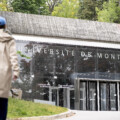
‘Humility should be our bread and butter’: Why it’s a critical moment to rebuild public trust in Canada’s research universities

The mainstream media failed Canadians during the Freedom Convoy

